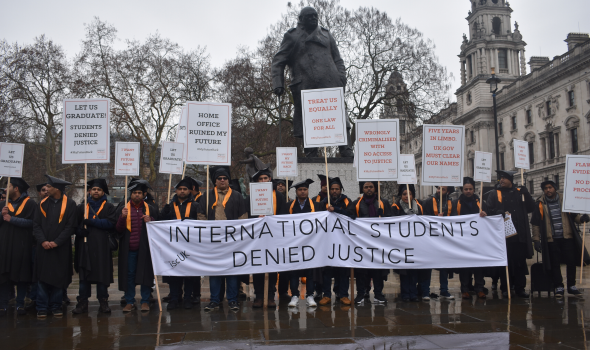Syed's story: "I came to the UK to study and lost my future"
Syed's story: "I came to the UK to study and lost my future"

Monitored constantly, branded a ‘liability’, feeling like a criminal. This has now become the reality of Syed’s experience in the UK higher education system. Yet it is a far cry from his experience when he arrived in the UK to study nine years ago.
Drawn to the UK by the reputation of its education system, Syed started his course at the London College of Advanced Management with high hopes for the future. Things started well, with Syed enjoying the experience and benefiting from services aimed at helping international students settle. Before long he had completed his Level 5 diploma in Leadership and Management.
“My initial year as a student in the UK was fantastic. The support I was given by my lecturers and college staff was incredible and there were other students like me who came from different backgrounds.”
By 2014, Syed had continued to make progress and was ready to apply for his Level 7, having completed his Level 6 the previous year. Syed had also sat the TOEIC test (the Test of English for International Communication), in order to get his visa extended and continue with his studies. Unfortunately, this would mark the beginning of a terrible ordeal.
Following a letter accusing him - falsely - of cheating, his extension was refused and the situation quickly deteriorated. No longer able to study, Syed instead found himself branded a criminal, caught up in a murky world of Home Office reporting centres and spiteful immigration enforcement officers.
“I used to stay awake at night because I was scared that immigration enforcement officers would raid my house and arrest me.”
After spending huge amounts in legal fees and winning his appeal, Syed eventually received a letter in February 2019, granting him just 60 calendar days within which to find an appropriate university sponsor and submit a fresh Tier 4 application. This would have been an unreasonably short allowance at the best of times, let alone in the middle of an academic year.
On top of this, Syed faced the challenge of being refused on the basis of a supposedly chequered immigration history. Universities variously described him as ‘high-risk’ or a ‘liability’, despite the fact he had won his appeal. It seems obvious that the allegation should simply have been wiped from his record. Fortunately, he has now found a place and resumed his studies.
Sadly, Syed is not alone in his experience. Described in Parliament as Britain’s ‘forgotten immigration scandal’, it has now emerged that over 34,000 international students were wrongly accused of cheating by the Home Office and a further 22,000 wrongly labelled possible cheats.
The cases that have made it to the courts have shown that the evidence the Home Office relied upon to make the accusations is largely absent – and where it does exist,
it’s deeply flawed. Students have been accused of cheating in one test centre, while having proof they sat the test in another. Others were accused having never sat the test at all. Migrant Voice has been working alongside the students since 2017, fighting with them for justice. Syed says he doesn’t think he would be where he is now without their involvement.
Six years on from those initial accusations and, despite Syed winning his case, it is hard to escape the sense that all parties have lost out in this saga. For Syed, one of the most frustrating things about the whole injustice is the feeling of a lost future, as well as being branded a criminal for no reason at all:
“The Home Office has made me suffer by wrongly presuming that I have done the TOEIC test non-genuinely, and has only ever used very generic evidence against me.”
Even now, like all international students in the UK, Syed faces constant monitoring by his university and the Home Office, making it hard for him to shake the feeling of being seen as a criminal.
For the UK government, and the UK in general, it is also difficult to see what has been gained by such a vindictive approach as was shown in the TOEIC matter. As well as tarnishing its reputation, it has successfully driven away talented and hard-working young graduates. Syed currently plans to return to Pakistan after his studies, although states that he would stay in the UK after graduation if the route to a post-study work visa was easy and not expensive. Whilst this is not the case at the moment, the Government’s proposed new ‘Graduate Route’ visa does mean it could be possible from next summer.
Even if this does prove to be the case, some of Syed’s most valuable years will never be regained. And without righting the wrongs of this scandal, or addressing its root causes, it seems the UK’s former reputation for higher education will also be lost forever.
This article was written and published as part of Migrant Voice's International Students Week (13-17 July 2020). We're celebrating international students in the UK and raising their voices on the issues that affect them. Read more here.
TOP IMAGE: Demonstration outside Parliament organised by TOEIC students and Migrant Voice, calling for justice for those wrongly accused of cheating, like Syed.


